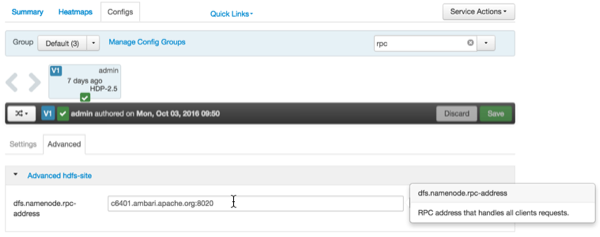Getting Correct Configuration Values for Manually-Deployed Clusters
If you have manually deployed your cluster, you must enter cluster configuration values in the Pig View Create Instance page. The following table explains where you can find cluster configuration settings in Ambari.
- Scripts HDFS Directory*
/user/${username}/pig/scripts
- Jobs HDFS Directory*
/user/${username}/pig/jobs
- WebHDFS FileSystem URI*
Click HDFS > Configs > Advanced hdfs-site > dfs.namenode.http-address. When you enter the value in the view definition, pre-pend
webhdfs://to the value you find in the advanced HDFS configuration settings. For example, webhdfs://c6401.ambari.apache.org:50070- WebHCat Hostname*
Click Hive > Configs > Advanced > WebHCat Server > WebHCat Server host to view the hostname. For example, c6402.ambari.apache.org
- WebHCat Port*
Click Hive > Configs > Advanced > Advanced webhcat-site > templeton.port to view the port number. For example, 50111
For NameNode High Availability
The following values must be entered for primary and secondary NameNodes:
- First NameNode RPC Address or Second NameNode RPC Address
Select the primary or secondary NameNode to view settings from that host in the cluster. When you enter the value in the view definition, pre-pend
http://to the value you find in the advanced hdfs-site settings. For example, http://c6401.ambari.apache.org:8020- First NameNode HTTP (WebHDFS) Address or Second NameNode HTTP (WebHDFS) Address
Click HDFS > Configs > Advanced > Advanced hdfs-site > dfs.namenode.http-address. When you enter the value in the view definition, pre-pend
http://to the value you find in the advanced hdfs-site settings. For example, http://c6401.ambari.apache.org:50070
To get First NameNode RPC Address values:
Steps
In Ambari Web, browse to the HDFS Summary page. Click NameNode (primary) or SNameNode (secondary) to view the host page:
On the host page, click Configs > Advanced.
Enter
rpcin the Filter search well at the top right corner of the page or navigate to the Advanced hdfs-site settings to find the dfs.namenode.rpc-address value that you can enter into the Pig View definition. Here is an example of using the Filter to locate a value:



